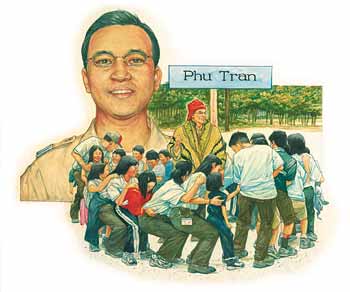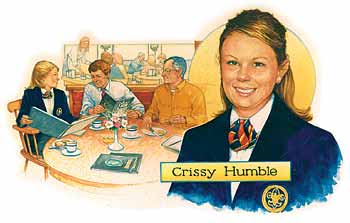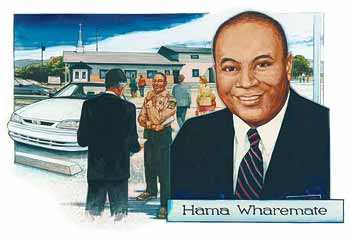'The Kind of Job I've Always Wanted'
By Bill Sloan
Illustrations By Joel Snyder
Many of the BSA's newest professional Scouters have left a variety of professional backgrounds to find satisfaction in a career where they are able to help change people's lives.
 Phu Tran had his first brush with the international Scouting movement as a 14-year-old Vietnamese refugee in a displaced persons camp in Indonesia. Today, after migrating halfway around the world, earning a degree in architecture from Ryerson University in Toronto, and moving from Canada to Texas to California, he's found a permanent home as a BSA professional.
Phu Tran had his first brush with the international Scouting movement as a 14-year-old Vietnamese refugee in a displaced persons camp in Indonesia. Today, after migrating halfway around the world, earning a degree in architecture from Ryerson University in Toronto, and moving from Canada to Texas to California, he's found a permanent home as a BSA professional.
"I tried sales work for a while and didn't like it," says Tran, now a 29-year-old district executive in San Jose's Santa Clara County Council. "But I do like selling the Boy Scout program because I believe in it so deeply."
Tran directs his evangelistic brand of salesmanship at a highly diverse audience in a district encompassing roughly half the city of San Jose. Although there is a high population of Hispanic youth in the district's 52 BSA units, nine units are predominantly Vietnamese.
"I think I relate well to both groups," Tran says. "The Scouting movement was traditionally strong in Vietnam before the war, and Vietnamese parents and children are generally very receptive.
"The program isn't as familiar to many Hispanics...But once we convince them that the program is good for their kids, they're very supportive. As a result, we're trying to open more new Hispanic Cub Scout packs in my district."
Tran didn't know there was such a thing as professional Scouting until 1996, when he met a BSA professional Scouter at Gilwell Park in London. In 2001, he moved from Toronto to Dallas, and later served as Scoutmaster of Troop 2001 and associate Advisor of Venturing Crew 2001 of the Circle Ten Council. He came to San Jose to start his professional career in early 2003.
"I still like architecture," he says, "but I was spending most of my free time on Scout-related activities, anyway. It's great being able to earn a salary doing something you love. I'm definitely in professional Scouting to stay."
 Crissy Humble will never forget the first time she donned her brand-new BSA uniform, stood up in front of a group of small boys, and announced:
Crissy Humble will never forget the first time she donned her brand-new BSA uniform, stood up in front of a group of small boys, and announced:
"Hi, I'm a Boy Scout."
"But you're a girl!" they giggled.
"Doesn't matter," Humble told them. "I'm still a Boy Scout."
That was four and a half years ago, when Humble was fresh out of Wright State University in Dayton, Ohio, with a degree in organizational communication. Today, youngsters and adult volunteers in Cincinnati's Dan Beard Council have long since gotten used to seeing Humble, 26, and a number of other women BSA professionals—in their uniforms.
"I started out as a Learning for Life executive, and I did feel a little uncertain when I first moved into traditional Scouting," Humble admits. She's now a senior district executive and one of seven females on the council's 25-member professional staff. "But this is the kind of job I've always wanted—a job that's fun, where every day's different, and there's always something new."
Humble, who followed a college friend's example in entering professional Scouting, has become a specialist in recruiting both youth and adults.
"I do a lot of school nights and 'boy talks' in the fall," she says with a laugh. "And I tell them, 'Hey, if I can be a Boy Scout, you can, too!'"
 All roads don't necessarily lead to Gillette, Wyo., a mining town of 23,000 in the northeastern corner of one of the nation's most sparsely populated states. But Hama Wharemate managed to find his way to Gillette—and a career in professional Scouting.
All roads don't necessarily lead to Gillette, Wyo., a mining town of 23,000 in the northeastern corner of one of the nation's most sparsely populated states. But Hama Wharemate managed to find his way to Gillette—and a career in professional Scouting.
With roots in New Zealand, Wharemate is a Maori, but he was born and raised in Australia. His epic journey leading to the BSA lasted nearly 10 years. Along the way, he earned a bachelor's degree in secondary education and a master's in public management at Brigham Young University. He worked as a substitute teacher, a probation officer for the State of Utah, and managed all operations for his wife's driving school.
Wharemate had also served as Scoutmaster of Troop 175 in Provo, Utah, but he'd never found a line of work that felt exactly right until February 2003.
"I was volunteering at the council shop in Provo, when a professional Scouter asked me if I'd ever considered going to work for the BSA full time," says Wharemate, 32. "My wife and I were in the process of selling our business, and since I'd loved the volunteer side of Scouting, I decided to give it a try."
Manning a Scouting outpost two hours' drive from Central Wyoming Council headquarters in Casper, Wharemate, a district executive, is the sole BSA professional for 640 youth in 43 units scattered across a vast area.
"I actually serve two districts, the second one in Sheridan, about 100 miles away," he says. "This means I spend a lot of time on the road, but I love it. For me, the big draw is working with youth. I've seen Scouting make changes in people's whole lives, and that's a powerful motivation."
As Scouting expands and the need for professional Scouters grows, Scout executives are increasingly turning their attention to the ranks of their own volunteers to fill the need.
"We make every effort to fill staff vacancies from within as they occur," says Roy Rhodes, Scout executive of the Memphis-based Chickasaw Council.
"Most of our district executives keep in touch with volunteers in their districts who might be interested in becoming professionals."
Rhodes points out that the BSA salary and benefits package for new unit-serving professionals is highly attractive in comparison to starting salaries in other fields. Entry-level pay for district executives currently stands at $34,000 per year, which is more, for example, than many school districts offer new teachers, or even those with several years' experience.
"BSA salaries look especially good compared to what many professional people are making in junior management positions with major retail chains," says Rhodes.
But for most who undertake Scouting careers, the attraction goes far beyond a mere paycheck.
Adds Hama Wharemate: "For me, money's not the determining factor. Feeling good about what I'm doing is more important. I was offered a real estate job not long ago where I could've made up to three times my Scouting salary, but I turned it down with absolutely no regrets. I plan to stay in Scouting from now on."
"Selecting a career has a tremendous influence on every aspect of your life," says Carolyn C. Altemus, diversity/recruiting specialist in the Human Resources Administration Division at BSA national headquarters.
"Whether you've begun to feel burnout in the corporate world, have recently retired from the armed services, or just have felt the need for a change in your career path, you can find rewarding opportunities as a Scouting professional. This is especially true for people with experience as BSA volunteers."
Skills in such areas as public relations, marketing, fund-raising, finance and accounting, sales, business management, and human relations can be valuable assets in a Scouting career, Altemus says. But BSA positions are open in about any professional field to men and women with a college degree or equivalent.
If joining Phu Tran, Crissy Humble, and Hama Wharemate in a job that never gets old and offers something different every day sounds appealing to you, Altemus adds, there's never been a better time to "turn pro."
For more information on professional careers in Scouting, visit the Employment Opportunities page on the BSA Web site at www.scouting.org or write to the BSA Executive Selection Service, S416, P.O. Box 152079, Irving, TX 75015-2079.
Bill Sloan, a Scouting magazine contributing editor, is the author of numerous books, including his latest, Given Up for Dead: America's Heroic Stand at Wake Island, published by Bantam.
September 2004 Table of Contents
Copyright © 2004 by the Boy Scouts of America. All rights thereunder reserved; anything appearing in Scouting magazine or on its Web site may not be reprinted either wholly or in part without written permission. Because of freedom given authors, opinions may not reflect official concurrence.